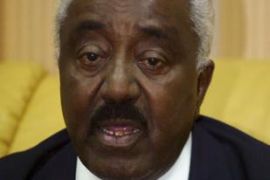Sudan rejects ICC ruling on Darfur
Sudan’s justice minister says his country will not hand over the indictees for trial.

| Your Views | ||
|
The court said the two were suspected of war crimes and crimes against humanity including rape and murder.
Haroun and Abd al-Rahman were part of a conspiracy to “persecute civilians they associated with rebels,” Moreno-Ocampo said.
The UN Security Council in March 2005 had asked the ICC to launch an investigation into the violence in Darfur, which the US has called genocide, a charge Khartoum denies.
Haroun told Al Jazeera that the ICC had “no jurisdiction to take action on this issue for the simple reason that the government of Sudan did not approve the ICC basic law”.
“The real issue is not a legal one, it is purely political,” he said.
“When [Moreno-]Ocampo becomes able to try those who bomb children and innocent people beyond their borders, such as [US President George] Bush and [former Israeli prime minister Ariel] Sharon, we would consider standing for trial before the ICC. This is part of a psychological warfare where double dealing is an accepted norm.
“Ironically, those who carry arms against the state and terrorise innocent people in the Sudan and elsewhere, would be branded as heroes, while those who perform their duties by countering them, should face baseless charges.
Violent conflict
| Timeline |
Analysts say about 200,000 people have been killed and 2.5 million others driven from their homes in Darfur since 2003, when rebels took up arms against the government, charging it with neglect. Khartoum says about 9,000 people have died.
Moreno-Ocampo has said he would examine whether Sudan’s government is conducting its own judicial proceedings over Darfur as the ICC is only supposed to prosecute when national courts are unwilling or unable to act.
Rights groups say Khartoum’s own investigations and tribunals for crimes in Darfur have been largely for show.
The ICC, the world’s first permanent war crimes court, started work in 2002 and is now supported by 104 nations, although still not by Russia, China and the US.
Washington fiercely opposed the creation of the ICC, fearing it would be used for politically motivated prosecutions of its citizens.
But Washington has refrained from blocking Darfur’s referral to the ICC.